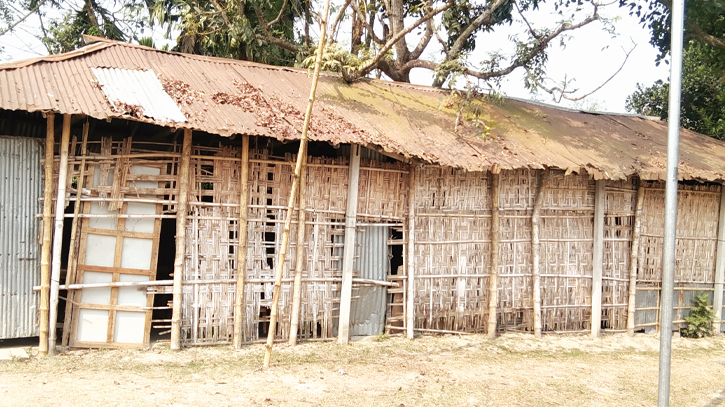
Photo: Collected
Swashakandar Byangmari High School in Sayedpur Upazila of Nilphamari is facing a critical shortage of classrooms, impacting over 150 students studying in just 5 small rooms. Despite efforts to address the issue with temporary structures like bamboo fences and tin houses, these makeshift solutions have deteriorated, causing distress for students.
Established in 2002 as Bangmari Lower Secondary School and later upgraded to a high school, the institution operates with limited resources. Initially, makeshift solutions like bamboo fences and tin rice houses were used, but these have deteriorated over time, exacerbating the students' plight. The institution faces a teaching paradox, with authorities fearing a potential disaster during the upcoming summer and monsoon seasons.
The school, initially established as Bangmari Lower Secondary School in 2002, has since been upgraded to a high school. Despite efforts from local enthusiasts and the dedication of seven teachers and six employees, government support for infrastructure development has been lacking. Consequently, while student enrollment has increased, facilities have remained inadequate, particularly concerning classroom space.
Currently, classes are conducted in the cramped confines of a semi-paved tin building, where students are forced to sit in overcrowded conditions, often sharing benches. Additionally, the headmaster and staff operate from a makeshift office in a dilapidated structure at risk of collapsing.
The school's head teacher, Rezaul Karim, recounts the institution's humble beginnings and subsequent expansion to accommodate growing student numbers. However, as the demand for secondary education has risen, the school's limited facilities have become increasingly inadequate.Moreover, the risk of natural disasters threatens the safety of staff and vital educational materials stored in the compromised office space.
Despite protests and appeals to local authorities, including former members of parliament, no lasting solution has been forthcoming. As the winter passes, concerns heighten for the impending summer and monsoon seasons, where existing structural issues will only exacerbate.
Immediate action is needed to construct additional classrooms to alleviate the crisis and maintain educational standards. The school appeals for cooperation from relevant authorities to address the pressing issue, suggesting both temporary repairs and long-term solutions involving the Facilities Department and teacher recruitment efforts.
Messenger/Faria








